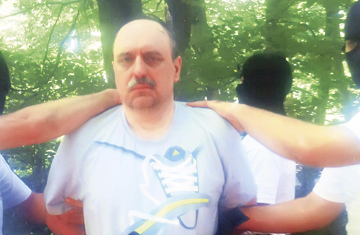
Goran Hadzic, a Croatian Serb wartime leader indicted for crimes against humanity during the 1991-95 Croatian war in seen this handout photo taken during his arrest in Fruska Gora national park, July 20, 2011
The arrest on Wednesday of Goran Hadzic, the last war-crimes suspect sought by the international court for the former Yugoslavia, sent two powerful messages. One signaled the near and natural end of the effort to bring justice to the victims of the Balkan wars of the 1990s. The other opened a new chapter for Serbia, a country eager to shed the burden of the crimes committed in its name.
It now seems clear that Hadzic, indicted for systematic murder and torture of Croatian civilians some 20 years ago, will be the last man to be tried by the International Criminal Tribunal for War Crimes in the former Yugoslavia (ICTY). He is charged with 14 counts of crimes against humanity which occurred during his reign as the political leader of Serbia's attempt to carve out a self-styled "republic" from Croatia in 1991.
So far, the Tribunal has indicted 161 people, most of them Serbs, for war crimes ranging from genocide to heavy breeches of the Geneva conventions. The majority have been convicted, and only a handful of trials are still unfolding, including that of Radovan Karadzic and Ratko Mladic, the architects of the Srebrenica massacre in 1995. However, Slobodan Milosevic, the mastermind of Yugoslavia's bloody breakup, evaded justice by dying of a heart attack during trial in 2005.
Now, with Hadzic finally in the dock, the ICTY may shut down in 2015 as scheduled, with no pending cases left behind. On Wednesday, Judge O-Gon Kwon, the acting head of the court, called the Hadzic arrest "a milestone in the tribunal's history."
But it's also a milestone in Serbia's history. When Milosevic was kicked out of power and delivered to The Hague over a decade ago, many assumed that Serbia's days as Europe's pariah were soon to be over. It turned out that ousting Milosevic was much easier than erasing his legacy, which included a corrupt political system coupled with virulent nationalism.
One of Serbia's main obstacles on the road to European Union membership — which all post-Milosevic governments vowed to aim for — was the apparent failure, through lack of will or competence, to arrest the fugitive war criminals. For more than a decade, people indicted for some of the worst imaginable crimes lived undisturbed among their fellow Serbs, while the authorities claimed they had no knowledge of their whereabouts. Fearing nationalist backlash, critics say, politicians were dragging their feet on making arrests. It's worth nothing that, unlike in the cases of Karadzic and Mladic, no protesters turned up on the streets after Hadzic's arrest. In 2006, the E.U. suspended accession talks with Serbia over its lack of cooperation with ICTY, and kept them frozen for more than a year.
This changed in 2008, when the Democratic Party, led by President Boris Tadic, took power. Like his predecessors, Tadic promised to tackle the issue of war-crimes fugitives, but many observers were skeptical. When Karadzic was arrested early in the new government's shift, there were off-the-record speculations that Serbian authorities were playing games by timing the arrests in order to maximize political profits. Those theories continued after the arrest of Mladic two months ago and Hadzic's arrest on Wednesday.
Speaking in a televised address delivered the same day, President Tadic dismissed such allegations as baseless, and also denied claims that the arrests were the result of pressure from the West, insisting that they were done out of the government's desire to contribute to Balkan reconciliation. "We do not respond well to pressure," he said.
Serbia is now much closer to getting its coveted status of candidate for E.U. membership, which is expected to be confirmed in October, and may even soon begin the negotiation process, which would put it on a firm track to Europe.
But another problem already looms: Kosovo, Serbia's breakaway province which declared independence in 2008 and is recognized by all of its neighbors (except Serbia) and most Western countries as a sovereign state. Serbia still claims Kosovo as its own territory, despite the fact that it is mostly populated by ethnic Albanians who would rather fight than return to Belgrade's rule. The talks on technical issues between Belgrade and Pristina, mediated by E.U.-appointed British diplomat Robert Cooper, collapsed earlier this week after some initial success.
A number of senior Western diplomats, including U.S. Undersecretary of State William Burnes, have already indicated that Serbia would not be able to join the E.U. unless it recognizes the loss of Kosovo. With the problem of war-crimes fugitives behind him, it is the issue of Kosovo that will test Tadic's claims about Serbia's sincerity toward improving regional relations, and its resistance to foreign pressure.
